Over-cleansing and over-sanitizing can take a serious toll on your skin—particularly your hands! I wash my hands a lot during the day, and I feel like it zaps the moisture from my skin. It’s incredibly easy (and inexpensive) to make your own antimicrobial foaming hand soap that will do a great job at keeping you germ-free without destroying your protective skin barrier.
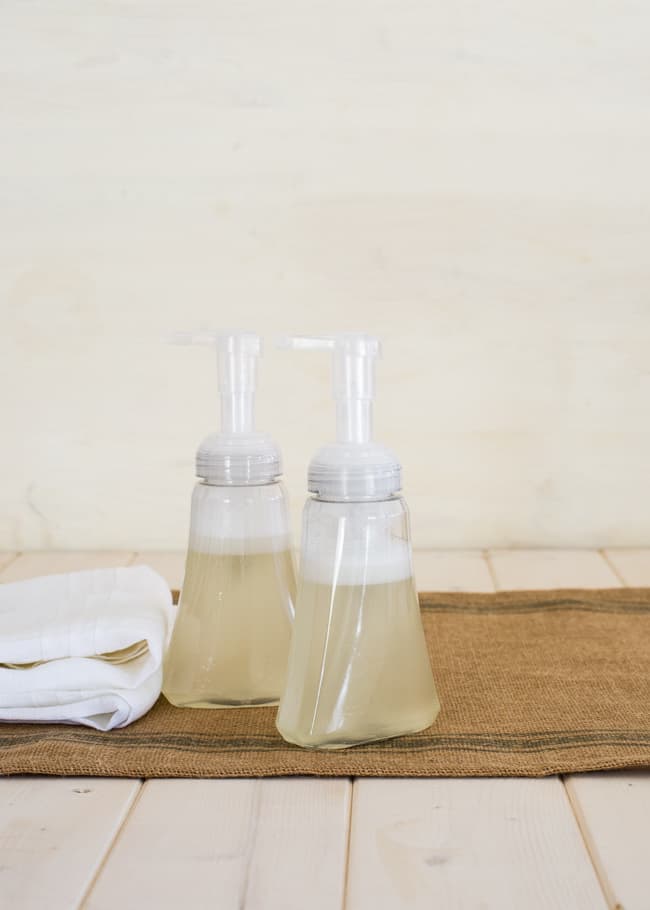
The Magic of Soap
According to the Centers for Disease Control and Prevention (CDC), soap is more effective at removing certain types of germs than alcohol-based hand sanitizers [source]. You see, soap has two layers—one that’s attracted to water and one that’s attracted to fat. Meanwhile, viruses have an outer layer of protein and fat surrounding them. When viruses come in contact with soap, their fat coating gets ripped off, destroying them in the process.
Soap has also been shown to eliminate bacteria from the hands more effectively than rinsing with water alone [source]. And it doesn’t matter what kind of soap you use.
As long as it has suds, both homemade soap and store-bought work well against microbes without the need to add any additional antimicrobial agents like alcohol. Even the US Food and Drug Administration recommends leaving out the chemicals and just using soap and water [source].
Ingredients
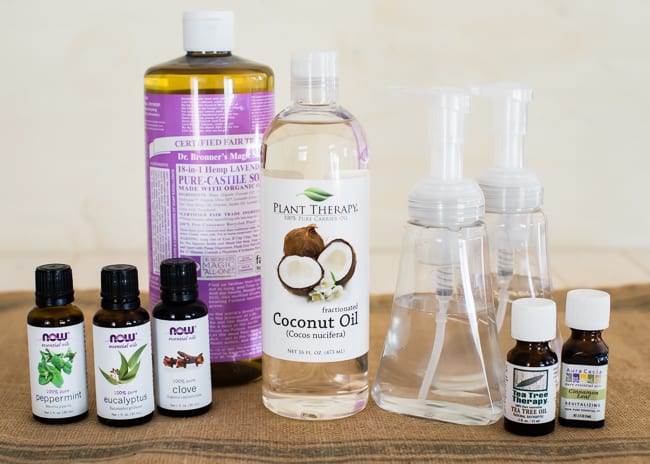
- Castile soap — I love making my own bath and body products, so I use Castile soap for practically everything!
- Fractionated coconut oil — It keeps my hands soft and locks in moisture. But unlike regular coconut oil, it doesn’t solidify in cooler weather, so it never causes issues with my soap.
- A blend of germ-fighting essential oils adds an extra layer of antimicrobial protection without drying out hands
- Water simply dilutes your foaming hand soap, so it makes plenty of suds, and you get more bang for your buck.
Instructions
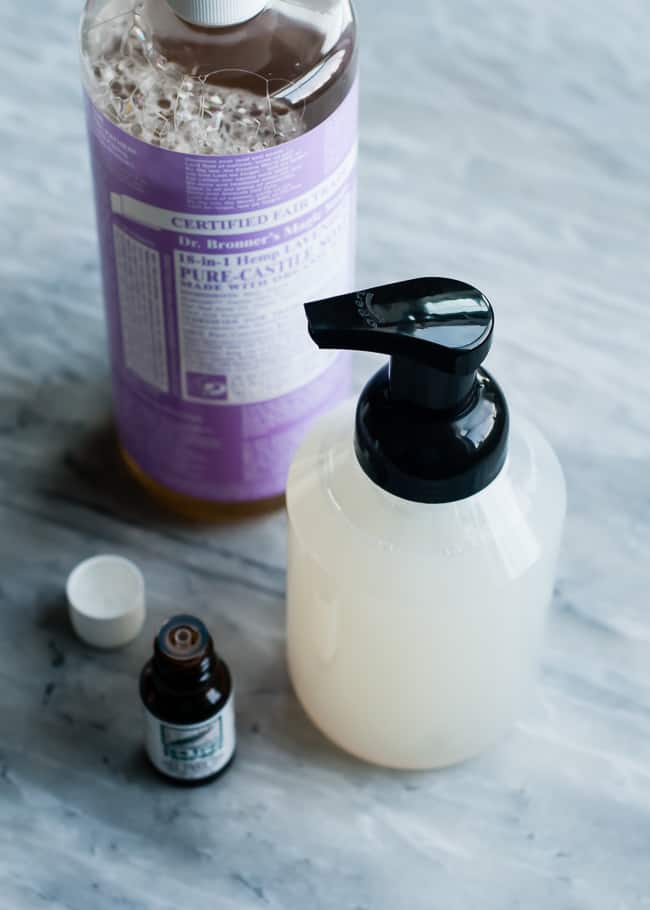
Step 1: Add Soap and Oil: Pour the liquid castile soap and your choice of oil into the foaming soap dispenser.
Step 2: Add Essential Oils: Add your chosen essential oils. This is where you can get creative!
Mix scents you enjoy or focus on the benefits you want (e.g., citrus oils for a refreshing and energizing scent). See below for more antibacterial essential oil options.
Step 3: Fill with Water
Slowly fill the dispenser the rest of the way with water. Leave enough room at the top to screw on the pump back on then swirl to combine.
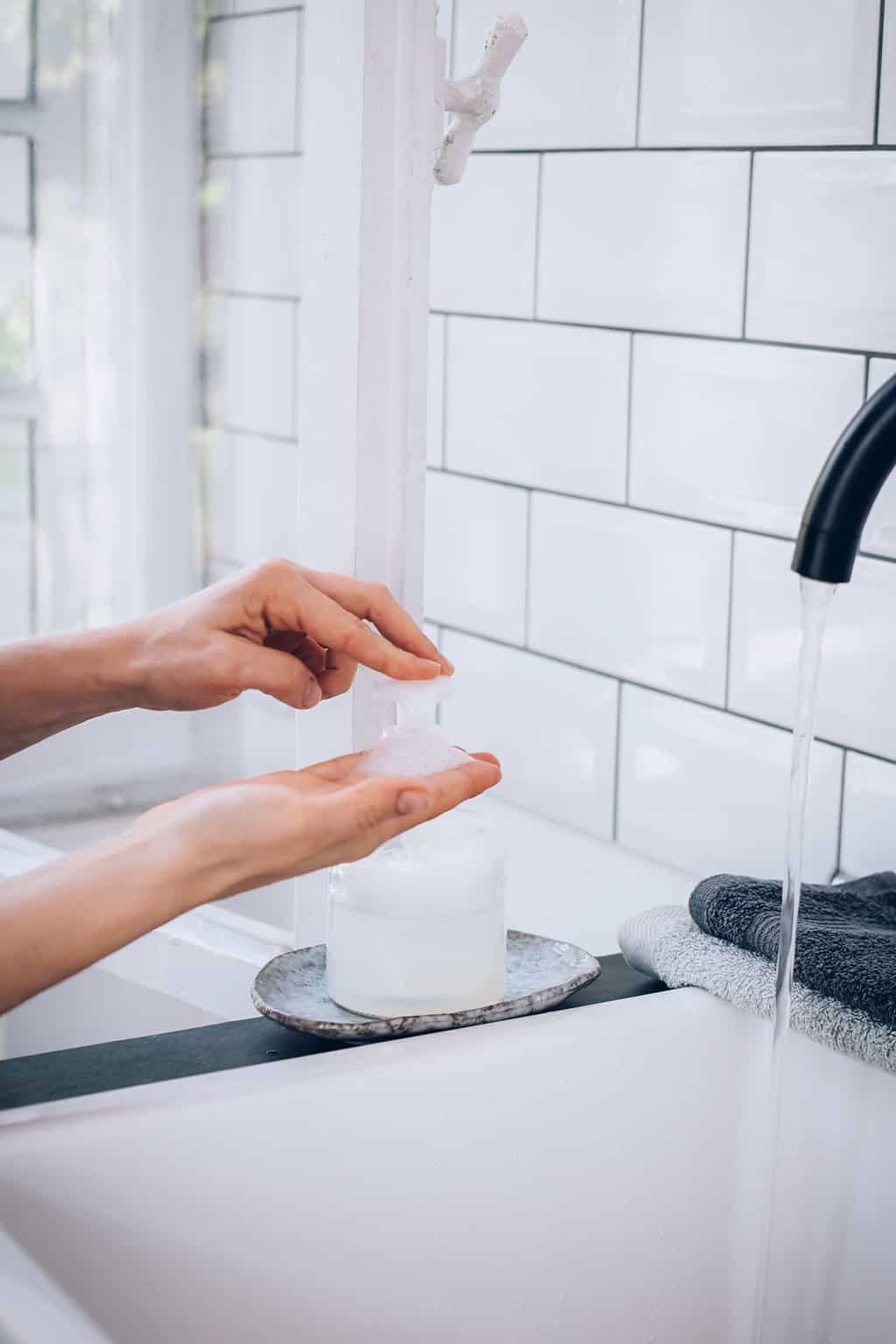
Step 3: Use Frequently
Dispense a couple of pumps of soap onto your hands and wash as normal. Rinse thoroughly.
Hint: Slowly adding the water will help avoid creating a bunch of bubbles. Also, gently swirl to mix the ingredients together instead of shaking the bottle for the same reason.
Step 4: Refill
When it’s time to refill, you can just add the same proportions of ingredients directly to the bottle—no need to clean it out each time unless you want to switch scents.
Substitutions
This homemade soap doesn’t contain any of the harsh surfactants that strip your skin of moisture, so it actually nourishes the skin and helps prevent the splitting and cracking that can increase your chances of getting an infection.
Aside from the Castile soap, the ingredients are pretty interchangeable.
- Fractionated coconut oil — Adding an oil helps moisturize my hands every time I wash them, so you can substitute jojoba, rosehip, sweet almond, or any other carrier oil that stays liquid at room temperature.
- Essential oils — You can use whichever oils you like and have at home—they don’t necessarily need to be known as antibacterial (the soap does most of the heavy lifting in this recipe). But since I don’t always wash my hands as thoroughly as I should, I love the peace of mind essential oils bring.
Some antibacterial essential oil options to try:
- Peppermint - antiviral, antibacterial, and antifungal effects [source]
- Eucalyptus - a natural germicide [source], may also help treat skin infections
- Clove - antimicrobial [source]
- Tea tree - naturally antimicrobial and antiseptic [source]
- Cinnamon leaf - antibacterial, anti-inflammatory, antiseptic [source]
Note: If you have sensitive skin, use less essential oil, as some of them can be irritating. The coconut oil acts as a carrier to dilute the essential oils, but use caution as some oils can sensitize the skin over time.
Equipment
I usually save a few plastic foaming soap dispensers and repurpose them. But you can find a bunch of different options online, such as these glass foaming soap dispensers and these plastic ones.
If you don't have a foaming container, try making your own liquid hand soap.
FAQ
In this case, no, not really. Regular coconut oil tends to harden at room temperature, which can result in clumpy soap and clog the nozzle of your bottle. Fractionated coconut oil stays liquid at all temperatures, so you never have to worry about clumping.
Yes! While coconut oil does have some antibacterial properties of its own [source], the soap is the main germ-fighter in this recipe. So you can feel free to swap any liquid carrier oil you like in place of the coconut oil.
You should never store undiluted essential oils in plastic as they are strong enough to break it down and affect the quality of the oil. But the essential oils in this recipe are so diluted that you shouldn’t run into any issues.
Naturally Antimicrobial Coconut Oil Hand Soap
Equipment
- 16-ounce foaming soap dispenser
Materials
- 3 tablespoons Castile soap
- 2 teaspoons fractionated coconut oil
- 15 drops clove essential oil
- 10 drops tea tree essential oil
- 5 drops each cinnamon, eucalyptus, and peppermint essential oils
- Water to fill
Instructions
- Combine the ingredients in an empty soap dispenser, then slowly fill the dispenser the rest of the way with water.
- Screw on the pump and shake well to combine.
Notes
This post was medically reviewed by Dr. Jennifer Haley, a board-certified dermatologist with extensive experience in medical, cosmetic, and surgical dermatology. Learn more about Hello Glow’s medical reviewers here. As always, this is not personal medical advice, and we recommend that you talk with your doctor.
References
Show me the science—when & how to use hand sanitizer in community settings. Centers for Disease Control and Prevention website.
Burton M, et al. The effect of handwashing with water or soap on bacterial contamination of hands. Int J Environ Res Public Health. 2011.
Antibacterial soap? You can skip it, use plain soap and water. U.S. Food & Drug Administration website.
Zhao H, et al. Peppermint essential oil: its phytochemistry, biological activity, pharmacological effect and application. Biomed Pharmacother. 2022.
Sabo VA, et al. Antimicrobial activity of Eucalyptus camaldulensis Dehn. plant extracts and essential oils: a review. Ind Crops Prod. 2019.
Batiha GES, et al. Syzygium aromaticum L (Myrtaceae): traditional uses, bioactive chemical constituents, pharmacological and toxicological activities. Biomolecules. 2020.
Carson CF, et al. Melaleuca alternifolia (tea tree) oil: a review of antimicrobial and other medicinal properties. Clin Microbiol Rev. 2006.
El Atki Y, et al. Antibacterial activity of cinnamon essential oils and their synergistic potential with antibiotics. J Adv Pharm Technol Res. 2019.
Lima EBC, et al. Cocos nucifera (L.) (Arecaceae): a phytochemical and pharmacological review. Braz J Med Biol Res. 2015.


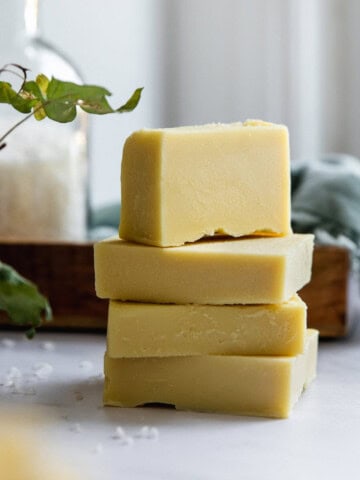

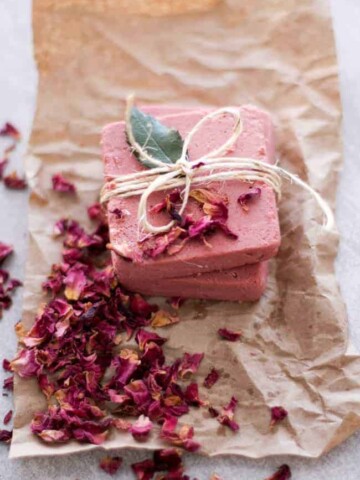

Leigh Ann says
I doubled this recipe and kept half in a glass mason jar. It solidified like crisco. Now what?
Rossana says
Is there a expiration date for this Antibacterial Coconut Oil Hand Soap once it has been made?
Stephanie Gerber says
There's no hard & fast rule here, but since it contains water, it won't last forever. However I've used one batch for months and it has been fine. To be super cautious, you could replace the soap every month. You'll get a longer shelf life if you use distilled water.
Stephanie Gerber says
I would try to use it up within 3 months or so
Ann Gloria says
This post is great! I was made and currently using a chamomile foaming soap but am excited to try this one, after finish my last soap. Thanks so much :)
dee says
can i use virgin coconut oil instead of fractionated?
Danette Garbi says
do you need to use castile soap in this?
Joy Kelly says
Can fractured coconut oil be used to make laundry smell good?
Suzan Vasica says
Fractionated coconut oil has no scent so no
Allison says
Can jojoba oil be used in place of the coconut oil?
Kim says
I love making my own hand soaps. I typically just use castile and essential oils, so I'm looking forward to trying your recipe with the added FCO!
Lesley says
I can't find new unused plastic foam soap dispensers anywhere (recycle 2, 3 or 5)
or glass ones...help?
I heard essential oils should only be kept in glass to keep chemicals from plastic from seeping in and to preserve it's strength. Any advice?
Kim says
Undiluted essential oils need to be stored in dark-glass bottles. Undiluted oils are highly concentrated and they will eat through plastic.
Most diluted essential oil blends….hand soaps, lotions, cleaning supplies, etc....are fine to be stored in plastic containers though. PET/PETE plastic (recycling code 1) is a popular choice for essential oil products because it’s safe, sturdy, and doesn’t seep chemicals into its contents.
You can find foam soap dispensers at most online stores that sell essential oils. Or you can do what I do and buy a 99 cent bottle of 8 oz foaming hand soap (PET plastic) from Walmart and just dump out the soap and clean it. :) It’s a lot cheaper than any of the foaming soap bottles I’ve found online.
dgklein says
you can find any type bottle you want here
A. Sanborn says
Thank-you for sharing this post. I noted you don't share links to the items not readily available if one lives in rural areas. I can't find all of these items in 'BOX STORES' or even our health food store pending cost effects.
Susan says
I found all those things on Amazon.
Amy says
Just what I needed. Thanks!